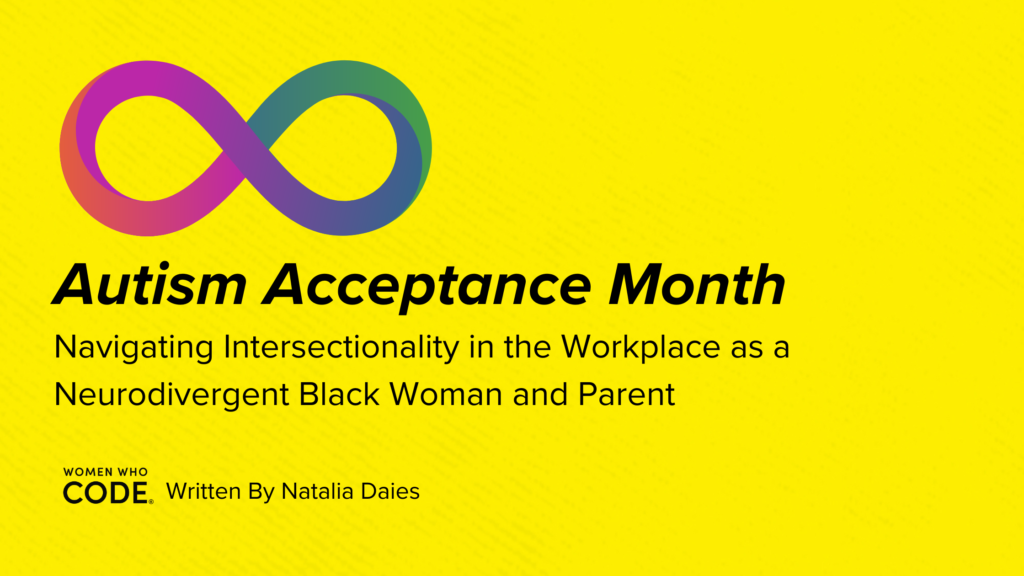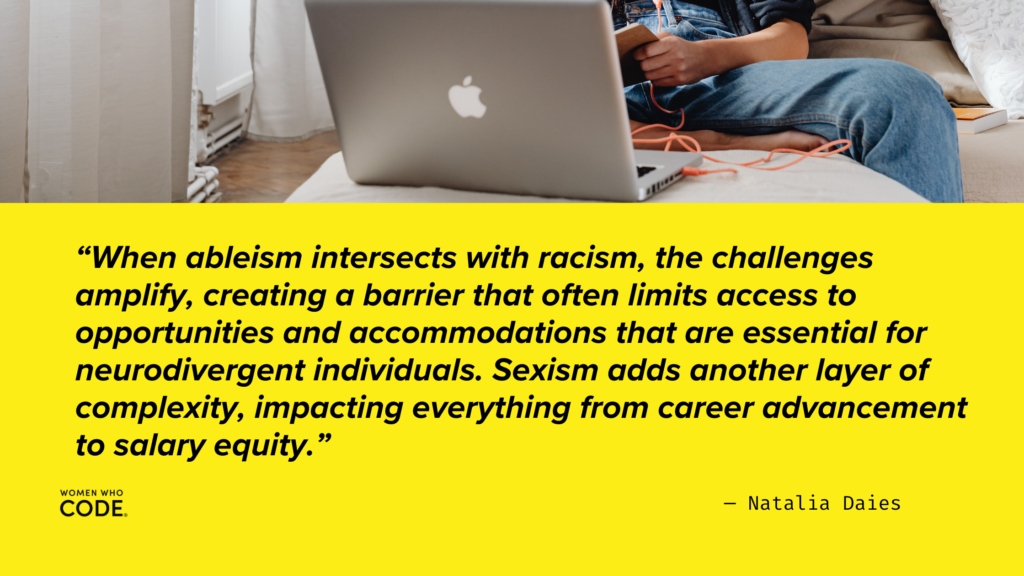Navigating Intersectionality in the Workplace as a Neurodivergent Black Woman and Parent
Written by Natalia Daies

When I became a parent, I prepared for all the things people told me to prepare for. I bought a crib and extra diapers, plug attachments for safety, a high chair, and bottle warmers so that I could stay in bed for nighttime feedings. I bought clothes in various sizes because babies grow exponentially in the first few months. I prepared for everything anybody told me I could prepare for; the thing I didn’t prepare maybe couldn’t have been prepared for — is that my son, who is perfect in every way — is autistic, which led to the discovery of my own neurodivergence and unmasking journey.
Uncovering my neurodivergence and navigating a world, especially workplaces not designed to accommodate people with disabilities, has made for a highly complex life experience. Now, taking into account that I am also a Black, queer woman often makes my everyday life feel like a maze of obstacles. The daily reality for those of us living at the intersection of marginalized identities, for me, Black, queer, autistic, and diagnosed with generalized and social anxiety, results in having to navigate persistent racism, ableism, and sexism, an experience that is often overlooked by those who do not share these identities.
Neurodivergence refers to variations in the human brain regarding sociability, learning, attention, mood, and other mental functions in a non-pathological sense. For neurodivergent parents like me, the intersectionality of our identity as parents, our neurodivergence, and our professional roles can present unique challenges in the workplace. Yet, the stigma associated with neurodiversity, coupled with racial and gender biases, can make these needs difficult to communicate.
When ableism intersects with racism, the challenges amplify, creating a barrier that often limits access to opportunities and accommodations that are essential for neurodivergent individuals. Sexism adds another layer of complexity, impacting everything from career advancement to salary equity.
For those of us who are neurodivergent and parenting autistic children, these intersecting inequalities can make the workplace feel overwhelming, from tokenism to microaggressions, and often having to choose which battles are worth fighting. Neurodivergent parents face a dual set of challenges as professionals and caregivers. In the workplace, we frequently encounter a lack of understanding about our neurodivergence, leading to difficulties in communication and misinterpretation of our behaviors. As parents, the demands of managing a neurodivergent child’s needs, appointments, and therapies make it difficult to cultivate a sense of work-life balance, often requiring flexibility that usually isn’t available in traditional work settings, which is exasperated by the systemic barriers our children face – our children who need our advocacy and support in a world that frequently misunderstands and undervalues them and punishes us as parents who are balancing the responsibilities of being both career professionals and advocates.

Advocating for Intersectional Disability Justice — From Awareness to Inclusion
Addressing the intersecting challenges of racism, ableism, and sexism in the workplace requires awareness and education. Employers and colleagues must understand the unique experiences of neurodivergent individuals and the additional layers of complexity faced by those who are also navigating racism and sexism. However, it’s not enough to merely acknowledge discrimination. There must be a concerted effort to understand the nuanced ways these inequities affect individuals—especially those with invisible disabilities in the workplace. Individuals with conditions like ADHD, social anxiety, or ASD often face significant barriers, from biases in hiring practices to the lack of accommodations that allow us to thrive in our roles.
Intersectional disability justice is more than access; it’s about creating environments where everyone can participate fully and be valued for their contributions. It involves challenging the norms of workplace culture that exclude or penalize those who navigate the world differently. It also means understanding the impact of intersecting identities for women of color with disabilities who have taken on the responsibilities of caregiving and are amongst the most marginalized.
We need allies willing to listen, learn, and take action alongside us to dismantle the barriers that hold us back.
As we continue to advocate for intersectional disability justice and awareness, it’s crucial to remember that this is not just a fight for those directly affected. It’s a call to action for society to recognize we can create a more inclusive world by embracing the diversity of human experiences and working to ensure that all individuals have the support and resources they need.
For other parents, individuals, and allies out there, remember that your voice matters. Sharing our stories, educating others, and advocating for change are powerful tools in fighting for equity.